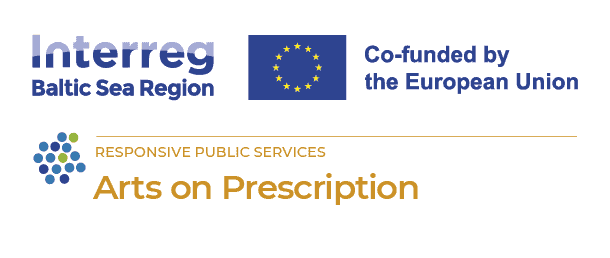
Evaluation of the Funen Arts on Prescription programme for young adults in Denmark
27 September 2024
Over the past eight years many municipalities in Denmark have tested, developed, and proved that Arts on Prescription concept has a beneficial effect on adults. Nine member municipalities of the Culture Region Funen tested the concept. Four of the municipalities tested and piloted AoP programmes for the adult (30-65 yrs) target audience in 2022, and the remaining five municipalities tested and piloted the programme for the young adults (15-30 yrs) target audience in 2023.
On completion of the Funen Arts on Prescription project, an evaluation report in collaboration with the Institute of Cultural Sciences at the University of Southern Denmark has been published in April 2024: Evaluering_af_Fynsk_Kultur_p_Recept-SDU-2024-FINAL.pdf (external link)
Previously we have shared highlights, experiences and findings from the AoP programmes targeted the adult groups – see our news entry from September 2023.
Now we will share the six most important experiences and conclusion from the young adult target audience:
#1 Culture on Prescription has a positive impact on well-being – also for young people
Just like the adults, the young people were asked about their well-being before and after the programme. The conclusion from the evaluation is clear. The young adults who participated in the Arts on Prescription programmes wellbeing has increased, and for most of them, both their mental and social health have improved.
#2 A fellowship with like-minded individuals without the need to talk about it provides security
Many of the young people reported that they made new friends and become part of a new fellowship, during the programme. They expressed that it was reassuring for them to know that everyone had “some kind of issue” without needing to talk about it. Many feel that being with like-minded individuals has strengthened their social skills. Many of the young participants also expressed that they have gained a better structure in their daily lives that they have “something to get up for,” in addition, they have acquired methods to tackle challenges as a result of participating in the Arts on Prescription programme.
#3 Young people experience success through cultural activities
The evaluation clearly shows that the arts and activities have has a positive experience on their ability to concentrate and experience flow, as well as producing something they feel proud of. Additionally, the activities have provided the young people with something to meet and talk about and something to share with family and friends. The young people have particularly benefited from participating in various cultural activities, as it promotes the imagination of other ways of living and self-acceptance. Several young people plan to or are already using local cultural activities as a subsequent effect of participating in Arts on Prescription.
#4 The link worker plays a crucial role as a consistent figure of security
The municipality’s link worker played an important role, especially for the young people. The fact that the link worker participated every time and followed up on problems and absences in a friendly and non-controlling manner created security, continuity, and clarity for the young participants in the AoP programmes. It was perceived as an important factor that the link worker was both professional but also had a personal touch in their way of relating with the young people.
#5 It is meaningful that it is a voluntary, diagnosis- and performance-free space
Many young people called it a free space or a kind of club to participate in Arts on Prescription. It is perceived as crucial that it is both voluntary whether one attends and to what extent one participates, and that no specific demands are made. At the same time, they also emphasize the importance of being free to share diagnoses and challenges with each other if and when they choose to.
#6 Recruiting young people takes time and requires patience and early involvement of partners
In Funen it has been particularly challenging to recruit young people to the AoP programmes. Previous experience from previous projects in Denmark targeting adults have also proved challenging. It takes time for those who recruit to understand the concept, and it benefits participants. Also, young people are not just young people, hence recruitment requires different approaches depending on which youth target group is being recruited. In Funen it has been easier to recruit from the Preparatory Basic Education (FGU) and the Municipal Youth Initiative (KUI) and harder to recruit from high schools.
Professor Karen Hvidtfeldt and specialist consultant Anne Høgedal working at the Institute of Culture and Linguistics at Syddansk Universitet were responsible for the qualitative evaluation of the project.
Project lead at the Culture Region Funen is Mathilde Kihl Kellermann. For more information and video footage on the Funen project, please visit: https://www.kulturregionfyn.dk/kultur-sundhed (external link)





